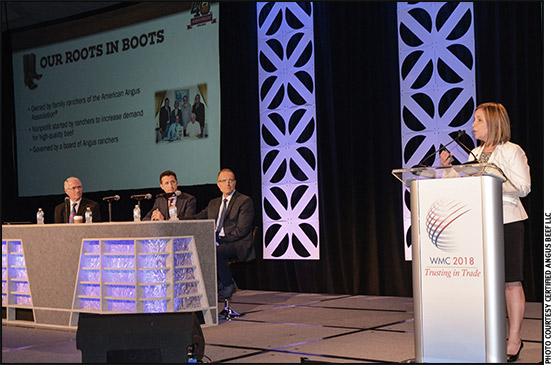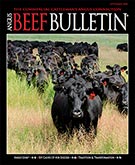
Melissa Brewer of Certified Angus Beef® brand explains the history behind the company’s brand as part of a panel discussion on serving the consumer of tomorrow. Seated (from left) are Mick Sloyan of the UK Agriculture and Horticulture Development Board, Pol Moragas of Spain’s Business Federation of Meats and Meat Industries, and Michael Uetz of Midan Marketing.
World Meat Congress
Focuses on Consumer Trends, Production Technology
Experts discuss the future of meat at World Meat Congress.
The 2018 World Meat Congress concluded Friday, June 1, with sessions focused on consumer trends and education, as well as an in-depth look at cutting-edge technologies reshaping meat production around the world. The 22nd World Meat Congress was hosted in Dallas, Texas, May 31 and June 1. Presented by the U.S. Meat Export Federation (USMEF) and the International Meat Secretariat (IMS), the event drew about 700 participants from more than 40 countries.
Friday’s keynote speaker was best-selling author Jeff Fromm, whose books include Marketing to Millennials, Millennials with Kids and Marketing to Gen Z. Fromm is also a partner at Barkley, a company that assists with establishment and enhancement of brands and helps businesses identify emerging consumer trends.
Fromm told the audience that food has become more than just a category of products consumers buy and enjoy — it is also a means of expression.
“How many of you used to have fashion as the thing that drove you, as a young person, to sort of express yourself?” he asked. “Today’s modern consumer expresses themselves through food. Discretionary purchases on food have increased at a dramatic rate, at a time when discretionary purchases on fashion haven’t. So they are trading ‘category: fashion’ for ‘category: food’ as a way to express themselves.”
Fromm said farmers and ranchers, and those in meat processing and merchandising, absolutely must better connect with consumers by sharing details of the story behind their products.
“Today’s consumer is a ‘pro-sumer,’ which means they are going to co-create their story and it’s about ‘Brand Me,’ ” Fromm explained. “The reality is that consumer has a lot of expectations. They expect to have a seat at the table. And if you’ve heard in the past that it’s just about being transparent, our research suggests that’s going to get you a ‘C’ on your report card. In ‘Tomorrowland,’ you’re going to have to offer proof that the story you are living is real — which is a step beyond transparency.”
Following Fromm’s address, World Meat Congress attendees learned about new tools to improve food safety, the value of gene editing to the world’s food production systems and the impact of blockchain technology in a panel discussion titled, “On the Cutting Edge: What’s New in the Red Meat Supply Chain?”
Gary Smith, a visiting professor in the Animal Science Department at Texas A&M University and Colorado State University, moderated the panel of scientists deeply involved in cutting-edge research into technologies that are quickly changing how meat and other foods are being produced, managed and delivered.
The panel featured Gary Rodrigue, blockchain food trust leader for the IBM Corp.; Martin Wiedmann, Gellert family professor in food safety at Cornell University; and Alison Van Eenennaam, cooperative extension specialist for animal genomics and biotechnology at the University of California–Davis (UC–Davis).
Blockchain technology is a tool that presents tremendous opportunities for innovation and more trustworthy global business transactions. While the term “blockchain” is often confused with cryptocurrency, Rodrigue explained that the blockchain technology he was focusing on is quite different, and that it “is going to change every aspect of your business — it’s going to change how supply chains are managed.”
Wiedmann, whose academic program is to develop and communicate the scientific knowledge needed to prevent and control foodborne and zoonotic diseases caused by bacteria, explained the value of genome sequencing and other scientific tools used to monitor and trace incidents such as outbreaks of listeria or salmonella. He also shared other aspects of his research, which is focused on developing a better understanding of the pathogenesis, ecology, evolution and transmission of bacterial foodborne diseases.
Van Eenennaam, whose program at UC–Davis focuses on research and education around the use of animal genomics and biotechnology in livestock production systems, explained the value of gene editing. For example, research is under way to utilize gene editing to prevent such diseases as African swine fever in hogs and tuberculosis in cattle.
“What better way to approach dealing with disease than through genetic improvement?” she noted.
In a session titled, “Societal Norms and Implications for the Industry,” panelists focused on the fact that consumers are growing more informed and demanding about the specific food production practices and attributes of the products they buy. They noted that the meat industry and other food industry sectors must strive to find ways of meeting these growing expectations, while also delivering affordable, sustainable food supplies.
Moderated by Mary Ann Binnie, manager of nutrition and industry relations for the Canadian Pork Council, the panel featured Lisa Watson, social responsibility officer at the Innovative Center for U.S. Dairy; Justin Ransom, senior director of sustainable food strategy for Tyson Foods; and Roxi Beck, consumer engagement director at the Center for Food Integrity. Beck is also vice president of Look East, a public relations agency focused on growing trust in products, processes, people and brands in the food and agriculture industry.
IMS Secretary General Hsin Huang assembled a panel of industry experts to illustrate the critical issues on which IMS advocates for the global meat industry. IMS engages with international and intergovernmental organizations to promote a fact-based and science-based approach to public policy and establishment of international standards.
The panel featured Bernard Vallat, president of the French Federation of Charcutiers, Caterers and Meat Processors (FICT), who discussed key issues related to animal welfare, antibiotic use in animals and antibiotic resistance. Jurgen Preugschas, director of the Western Hog Exchange, focused on sustainable livestock production practices, and Shalene McNeill, executive director for human nutrition research at the National Cattlemen’s Beef Association (NCBA) offered her thoughts on dietary guidelines and the importance of educating key audiences about the nutritional value of red meat and its role in a balanced diet.
The day’s final panel focused on the consumer of tomorrow and what the red meat industry must do to properly identify and address the desires and expectations of future generations. Moderated by Mick Sloyan, pork strategy director with the Agriculture and Horticulture Development Board of the United Kingdom, the panel featured Melissa Brewer, director of communications for Certified Angus Beef® (CAB®) brand, who explained the history behind the company’s brand and how it thrives on authenticity and a proven track record of meeting customers’ quality expectations.
Michael Uetz, managing principal of Midan Marketing, a full-service marketing firm dedicated to serving meat industry clients, focused on demographic trends. He explained that meat consumers are segmented — ranging from “voracious carnivores” to “wavering budgeteers” to “selective foodies.” Pol Moragas, deputy secretary general of Spain’s Business Federation of Meats and Meat Industries (FECIC), discussed industry research that underscores the importance of developing and maintaining consumer loyalty — an ever-more daunting challenge as he foresees the future.
“From my very humble viewpoint, the consumer of the future is hyper-influenceable and not at all loyal,” he cautioned.
Speaking for IMS, Huang saw the 22nd World Meat Congress as a valuable, insightful experience for all participants.
“We are coming from different production systems and different animal species, but we all are facing similar challenges,” he said. “So this meeting was a great opportunity to come together to network and to address these challenges. USMEF did tremendous work in pulling together a great lineup of speakers, and Dallas was a wonderful location for the event.”
At the closing ceremony, IMS President Guillaume Roué and USMEF CEO Emeritus Philip Seng thanked attendees for their participation and support and introduced pork industry leader Pedro Tabaras, president of Granjas Carroll de Mexico. In an IMS tradition, Seng “passed the IMS flag” to Tabaras, who invited the audience to take part in the next World Meat Congress, which will be hosted in Cancun in 2020.

Editor’s Note: This article is provided by the U.S. Meat Export Federation.






